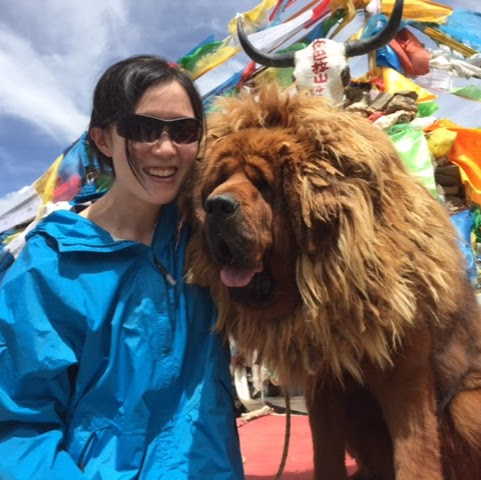Ying Tang
age ~33
from San Diego, CA
Ying Tang Phones & Addresses
- 17009 Avenida Visalia UNIT 14, San Diego, CA 92127
- Minneapolis, MN
Medicine Doctors

Ying Margie Tang
view sourceResumes

Senior Research Advisor- Biotdr And Ame- Eli Lilly And Company
view sourceLocation:
San Diego, CA
Industry:
Pharmaceuticals
Work:
Applied Molecular Evolution 1997 - 2004
Director of Research
Eli Lilly and Company 1997 - 2004
Senior Research Advisor- Biotdr and Ame- Eli Lilly and Company
Director of Research
Eli Lilly and Company 1997 - 2004
Senior Research Advisor- Biotdr and Ame- Eli Lilly and Company
Education:
Scripps Research 1991 - 1996
Doctorates, Doctor of Philosophy, Chemistry Zhejiang University
Doctorates, Doctor of Philosophy, Chemistry Zhejiang University
Skills:
Research

Ying Lun Tang
view source
Ying Tang
view source
Ying Tang
view sourceLocation:
United States

Ying Tang
view sourceLocation:
United States

Ying Tang
view sourceLocation:
United States

Ying Tang
view sourceWork:
Marketing Department
Feb 2014 to 2000
Intern Marketing Department
Guangzhou, CN
Jan 2013 to Mar 2013
Intern Client Service Department
Guangzhou, CN
Sep 2012 to Nov 2012
Intern HR Department
Guangzhou, CN
Jul 2009 to Sep 2009
Intern
Feb 2014 to 2000
Intern Marketing Department
Guangzhou, CN
Jan 2013 to Mar 2013
Intern Client Service Department
Guangzhou, CN
Sep 2012 to Nov 2012
Intern HR Department
Guangzhou, CN
Jul 2009 to Sep 2009
Intern
Education:
Ji Nan University
Jul 2013
Bachelor of Management in Marketing Johns Hopkins University Carey Business School
Master of Science in Marketing
Jul 2013
Bachelor of Management in Marketing Johns Hopkins University Carey Business School
Master of Science in Marketing
Us Patents
-
Recombinant Il-9 Antibodies
view source -
US Patent:7354584, Apr 8, 2008
-
Filed:Apr 12, 2004
-
Appl. No.:10/823253
-
Inventors:Jennifer Lynne Reed - Clarksburg MD, US
Herren Wu - Boyds MD, US
Ying Tang - San Diego CA, US
Julian Davies - San Diego CA, US
Jeffry D. Watkins - Encinitas CA, US -
Assignee:MedImmune, Inc. - Gaithersburg MD
-
International Classification:A61K 39/395
G01N 33/53 -
US Classification:4241451, 4241331, 5303913, 5303873, 53038823
-
Abstract:The present invention provides novel antibodies that immunospecifically bind to an IL-9 polypeptide and compositions comprising said antibodies. The present invention also provides methods and compositions preventing, treating, managing, and/or ameliorating diseases and disorders associated with aberrant expression and/or activity of IL 9 or IL-9 receptor or subunits thereof, autoimmune diseases, inflammatory diseases, proliferative diseases, and infections comprising administration of one or more antibodies thereof that immunospecifically bind to an IL-9 polypeptide. The invention also encompasses methods and compositions for diagnosing, monitoring, and prognosing these disorders. The present invention further relates to articles of manufacture and kits comprising antibodies that immunospecifically bind to an IL-9 polypeptide.
-
Humanized Collagen Antibodies And Related Methods
view source -
US Patent:7365167, Apr 29, 2008
-
Filed:Nov 26, 2001
-
Appl. No.:09/995529
-
Inventors:Jeffry D. Watkins - Encinitas CA, US
William D. Huse - Del Mar CA, US
Ying Tang - San Diego CA, US
Daniel Broek - Los Angeles CA, US
Peter Brooks - Carmel NY, US -
Assignee:Cell Matrix, Inc. - Carlsbad CA
-
International Classification:C12P 21/08
-
US Classification:5303873, 536 235, 530350, 5303871, 5303913, 5303917, 5303882
-
Abstract:The invention provides a grafted antibody, or functional fragment thereof, comprising one or more complementarity determining regions (CDRs) having at least one amino acid substitution in one or more CDRs of a heavy chain CDR, where the grafted antibody or functional fragment thereof has specific binding activity for a cryptic collagen epitope. The invention also provides methods of using an antibody having specific binding activity for a cryptic collagen epitope, including methods of inhibiting angiogenesis, tumor growth, and metastasis.
-
Humanized Collagen Antibodies And Related Methods
view source -
US Patent:7390885, Jun 24, 2008
-
Filed:Dec 6, 2001
-
Appl. No.:10/011250
-
Inventors:Jeffry D. Watkins - Encinitas CA, US
William D. Huse - Del Mar CA, US
Ying Tang - San Diego CA, US
Daniel Broek - Los Angeles CA, US
Peter Brooks - Carmel NY, US -
Assignee:Cell Matrix, Inc. - Carlsbad CA
-
International Classification:C12P 21/08
-
US Classification:5303873, 536 235, 530350, 5303871, 5303913, 5303917, 5303882
-
Abstract:The invention provides a grafted antibody, or functional fragment thereof, comprising one or more complementarity determining regions (CDRs) having at least one amino acid substitution in one or more CDRs of a heavy chain CDR, where the grafted antibody or functional fragment thereof has specific binding activity for a cryptic collagen epitope. The invention also provides methods of using an antibody having specific binding activity for a cryptic collagen epitope, including methods of inhibiting angiogenesis, tumor growth, and metastasis.
-
Humanized Collagen Antibodies And Related Methods
view source -
US Patent:7566770, Jul 28, 2009
-
Filed:Jul 14, 2006
-
Appl. No.:11/486894
-
Inventors:Jeffry D. Watkins - Encinitas CA, US
William D. Huse - Del Mar CA, US
Ying Tang - San Diego CA, US
Daniel Broek - Los Angeles CA, US
Peter Brooks - Carmel NY, US -
Assignee:Cell-Matrix, Inc. - Bethesda MD
-
International Classification:C07K 16/00
-
US Classification:5303871, 4241301
-
Abstract:The invention provides an antibody, or functional fragment thereof, a grafted antibody, or functional fragment thereof, comprising one or more complementarity determining regions (CDRs) having at least one amino acid substitution in one or more CDRs of a heavy chain CDR, where the antibody or functional fragment thereof has specific binding activity for a cryptic collagen epitope. The invention also provides methods of using an antibody having specific binding activity for a cryptic collagen epitope, including methods of inhibiting angiogenesis, tumor growth, and metastasis.
-
Aβ Binding Molecules
view source -
US Patent:7575747, Aug 18, 2009
-
Filed:Feb 6, 2004
-
Appl. No.:10/544050
-
Inventors:Julian Davies - San Diego CA, US
Ying Tang - San Diego CA, US
Jeffry Dean Watkins - Encinitas CA, US -
Assignee:Applied Molecular Evolution - San Diego CA
-
International Classification:A61K 39/395
C07K 16/18 -
US Classification:4241451, 53038825
-
Abstract:The present invention encompasses isolated antibodies, or fragments thereof, that are humanized variants of murine antibody 266 which employ complementarity determining regions derived from murine antibody 266. The variant antibodies are useful for treatment or prevention of conditions and diseases associated with Aβ, including Alzheimer's disease, Down's syndrome, cerebral amyloid angiopathy, mild cognitive impairment, and the like.
-
Antibodies To Tgf-Beta 1
view source -
US Patent:7619069, Nov 17, 2009
-
Filed:Oct 19, 2007
-
Appl. No.:11/874952
-
Inventors:Julian Davies - San Diego CA, US
Craig Duane Dickinson - San Diego CA, US
David Matthew Marquis - Encinitas CA, US
Ying Tang - San Diego CA, US
Peter Edward Vaillancourt - Del Mar CA, US -
Assignee:Eli Lilly and Company - Indianapolis IN
-
International Classification:C07K 16/00
A61K 39/395 -
US Classification:5303871, 4241301
-
Abstract:TGF-beta 1 binding compositions and reagents related thereto are provided. Methods of using such compositions for therapeutic purpose are also provided.
-
Variant Fc Regions
view source -
US Patent:7740847, Jun 22, 2010
-
Filed:Jul 18, 2005
-
Appl. No.:11/572634
-
Inventors:Barrett Allan - Encinitas CA, US
Weidong Jiang - Sunnyvale CA, US
Ying Tang - San Diego CA, US
Jeffry Dean Watkins - Encinitas CA, US -
Assignee:Applied Molecular Evolution, Inc. - San Diego CA
-
International Classification:A61K 39/395
C07K 16/28
C07K 16/30
C12N 15/13
C12N 15/63
C12N 15/16 -
US Classification:4241331, 4241441, 4241531, 4241551, 4241561, 4241731, 4241741, 4241431, 435 696, 4353201, 435325, 435326, 435328, 4353431, 435344, 4353441, 435358, 5303873, 53038822, 53038873, 530 388, 53038885, 536 2353
-
Abstract:The present invention provides humanized anti-CD20 antibodies comprising a human IgG1 Fc region comprising an isoleucine at position 247 and a glutamine at position 339 as well as nucleic acids encoding the antibodies and methods of using the antibodies for treating lymphoma. Furthermore, the invention provides compositions comprising the antibodies and methods of producing them.
-
Humanized Collagen Antibodies And Related Methods
view source -
US Patent:7763247, Jul 27, 2010
-
Filed:Feb 15, 2008
-
Appl. No.:12/070146
-
Inventors:Jeffry D. Watkins - Encinitas CA, US
William D. Huse - Del Mar CA, US
Ying Tang - San Diego CA, US
Daniel Broek - Los Angeles CA, US
Peter Brooks - Carmel NY, US -
Assignee:Cell Matrix, Inc. - Carlsbad CA
-
International Classification:A61K 39/00
-
US Classification:4241331, 5303873, 5303877, 5303888, 5303913, 5303917, 4241811
-
Abstract:The invention provides a grafted antibody, or functional fragment thereof, comprising one or more complementarity determining regions (CDRs) having at least one amino acid substitution in one or more CDRs of a heavy chain CDR, where the grafted antibody or functional fragment thereof has specific binding activity for a cryptic collagen epitope. The invention also provides methods of using an antibody having specific binding activity for a cryptic collagen epitope, including methods of inhibiting angiogenesis, tumor growth, and metastasis.
Classmates

Ying Tang
view sourceSchools:
Afton Elementary School Afton WY 2001-2005
Community:
Carole Ortega, Verd Erickson

Ying Tang
view sourceSchools:
Sagamore Hills Elementary School Atlanta GA 1998-2002
Community:
Tommy Jacobs, Lorraine Williams, Mindy Prator, Amy Patton

Fu-Shin High School, Taipei
view sourceGraduates:
Ying Tang (1976-1980),
Hsieh Ju (1981-1985),
Bing Ma (1980-1982),
Hsu Wenyu (1981-1985),
Tsai Kung Ying (1981-1985),
Vincent Chang (1971-1975)
Hsieh Ju (1981-1985),
Bing Ma (1980-1982),
Hsu Wenyu (1981-1985),
Tsai Kung Ying (1981-1985),
Vincent Chang (1971-1975)

Wainwright High School, T...
view sourceGraduates:
Mei Ying Tang (1953-1957),
Debbie Atkin (1969-1970),
Terry Haynes (1966-1969),
Criss Cloudt (1965-1966),
Gwendolyn Edwards (1971-1973)
Debbie Atkin (1969-1970),
Terry Haynes (1966-1969),
Criss Cloudt (1965-1966),
Gwendolyn Edwards (1971-1973)

West High School, Salt la...
view sourceGraduates:
Melinda Unsworth (1986-1990),
Casondra Gull (2003-2007),
Brandon Bills (1989-1993),
Terry Jacobs (1965-1969),
Ying Tang (1965-1969)
Casondra Gull (2003-2007),
Brandon Bills (1989-1993),
Terry Jacobs (1965-1969),
Ying Tang (1965-1969)

Cheuk Ying Tang
view source
Ying Tang
view source
Hoi Ying Tang
view source
Li Ying Tang
view source
Ying Tang
view source
Ying Ying Tang
view source
Ying Tang
view source
Suet Ying Tang
view sourceYoutube
Googleplus

Ying Tang
Work:
XingCloud - SDE (2010)
Education:
Huazhong University of Science and Technology - EI

Ying Tang
Work:
Tencent
Education:
Communication University of China - Advertising and new media

Ying Tang

Ying Tang

Ying Tang

Ying Tang

Ying Tang

Ying Tang
Flickr
Get Report for Ying Tang from San Diego, CA, age ~33













